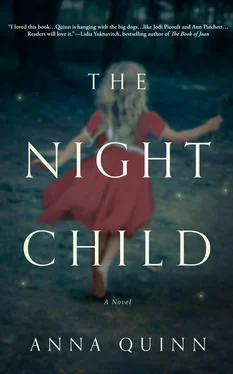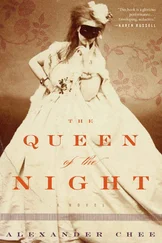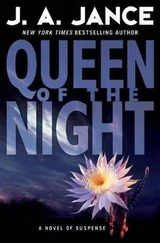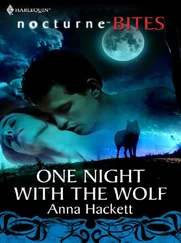He touches her arm. “I’ll check on her,” he says. “Right now. Do you hear me?”
Yes, yes, she nods, takes a deep breath, and closes her eyes.
“Nora, I need to tell Paul what’s going on. I’ll need to tell him about Margaret—probably best to tell James, too. Are you alright with that?”
He studies her face with unwavering eyes. She returns his look, unblinking, and at last she nods yes.
CHAPTER TWENTY-FIVE: February 11, 1997
“Someone sent flowers,” Carol says, handing Nora a bouquet of yellow sweetheart roses.
Nora takes the flowers and breathes in the delicate smell. Once Carol leaves, she pulls out the tiny white card stuck between the stems and lays the flowers on her chest. They’re from John.
I know you’re not seeing visitors yet, but I wanted you to know I’m thinking of you. The kids miss you. I miss you. Be well soon. Call me if you want.
She misses John. He is the only one she can talk to with complete freedom. He listens without trying to correct or fix. She can say anything she wants, and it’s all right.
“I believe Fiona is safe,” David says, entering the hospital room then, breaking her reverie. He takes his coat off and hangs it on the metal rack by the door. She reaches over and places the flowers in her water glass.
“Nora,” he says, genuine concern in his voice, “I really think she’s safe.”
Anxiety and relief distort her breath. She reaches for her notebook and pen, but before she can write anything, he says, “I’m going to keep meeting with her, for at least a couple of weeks and longer if necessary, but honestly, I think she’s okay. We talked and played for over an hour and she was quite animated—I didn’t see or hear anything to suggest she’s troubled about something. She’s worried about you, of course.”
Her eyes close. She can see Fiona sitting cross-legged on the couch in David’s office answering questions, biting her lip at first, her face scrunched with the effort to help.
“With each question I asked,” he says, “she relaxed more, and after awhile, it seemed she’d forgotten why she was there at all. She described all the fun she has with her daddy: riding the trolley to the aquarium and the library, listening to ball games on the radio, making pancakes in animal and heart shapes on Saturday mornings, and she didn’t talk in a way that suggested she was protecting him—I know that voice, Nora. She was very open—very unlike a child who is keeping a terrible secret. In fact, she told me all about the Valentine’s party coming up at school, and how excited she was to have James staying with them. This is all a good sign. If she’d been hurt, especially in the last few days, she would have been withdrawn or anxious, and frankly, I really doubt she’d have agreed to being left alone with me at all. Most abusers create an enmeshment where the child has no real sense of self—quite the opposite of Fiona. She seems very clear about her feelings and opinions—Nora, are you listening?”
She opens her eyes and turns to him. Caught somewhere between past and present.
“Nora, I was saying Fiona seems to have an incredibly strong separate self.”
An incredibly strong separate self . Nora thinks of a time not too long ago when she and Fiona had been shopping at Macy’s. Fiona had stopped in front of a full-length mirror, flexed her muscles like she’d often seen Paul do, and said, “I’m really strong, aren’t I, Mommy?” and Nora had smiled and said, “No question about that, darling! You’re a warrior goddess!” Fiona had walked a little closer to the mirror, brushed her wispy blonde bangs to the side, and said in a surprised voice, “And my eyes are so pretty,” her breath leaving a tiny blur of steam on the mirror. Nora had stood behind Fiona then, wrapped her arms around her. Her daughter so confident, so different than Nora had been as a child.
“You are the most beautiful little girl in the world, baby.”
“Mommy!” Fiona said, “I am not a baby!” And Nora had been startled, filled with sadness, realizing that indeed, Fiona was no longer a baby, that someday she would lose her.
David waits for a response, but when there is none, he says, “And the fact Paul had no qualms about me interviewing Fiona without him in the room is also a positive sign. He was really hurt by the accusation, that was clear, but I have to tell you, most of the abusive parents I’ve had contact with rarely allow an interview without protest or court order. Most will do anything to keep their inner circle private, protected.”
Even though she hadn’t believed Paul would ever hurt Fiona, right now in this moment, she trusts David’s perceptions more than her own. And James is with Fiona now too—he will know if something is wrong, he will watch out for her. She turns to look out the window, blinking away tears of frustration and confusion. The city lost in the blizzard—she can barely see two inches in front of her. Most will do anything to keep their inner world private. Protected.
And then, suddenly, her father, in her mind. How he didn’t believe in play dates; birthday parties; slumber parties; Halloween, with its masks and trickery; friends coming over. Not that she had any. Not that anyone in their family had any. Definitely no one had a “sense of a separate self.” She remembers too, how, except for the hours he worked and she attended school, she only wanted to be with him. A collage of images then: her in pajamas, sitting on the green porcelain bathtub watching him shave, so handsome in the mirror, the familiar smell of him; her organizing his tools in the basement while he built things—him lifting her up on the workbench to hang his wrenches, screwdrivers, and hammers on the pegboard; dancing after dinner in the living room to Patsy Cline while her mother washed dishes; him singing “Tennessee Waltz” to her while she played in the bathtub—her father’s voice singing, “ I was waltzing with my darling ,” as he dried her with a big white towel, him kneeling, then humming, humming into her ear, drying her back, her tummy, then breathing, breathing, loud breathing, the towel between her legs, then no towel only hands, his hands touching her. Her hands stiff at her sides. She is him. Her eyes closing. Private. Protected.
From far away, David’s voice, “You are safe. I am here. Let the images come, let them come.”
Her father’s voice whispering, “Our secret, our secret, our secret,” the hands rubbing between her legs, hard and fast.
CHAPTER TWENTY-SIX: February 12, 1997
The snow has finally stopped, and the city lays silent and vulnerable, covered thickly in white. An occasional car or person negotiates the steep, frozen hill. Skyscrapers, like icicles, vanish into cumulus clouds. An Ivar’s billboard on top of the Nordstrom building reads clam chowder worth surfacing for! Slices of Puget Sound glimmer between the buildings. Someone is crying down the hall. Someone is always crying down the hall. If the windows weren’t nailed shut, she could smell the ocean salt in the air. It is dusk of her tenth day in the psychiatric ward.
“Kind of a pretty picture,” David says, as he reaches down to pick up his thermos. He loosens the top and trickles coffee into his cup. He wears what he always wears, jeans and a black T-shirt, except today he also wears a black cardigan. She has on jeans, a slate-gray sweater, and her gray wool slippers—items Paul dropped off the first day she’d arrived. Six days ago, and he hasn’t come back since. Perhaps the doctor or David discouraged him, told him she needed to rest. Perhaps he’s furious about the accusations. Still, it seems a husband would insist, find a way to see his wife.
Читать дальше












